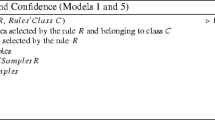Abstract
A novel Genetic Programming (GP) paradigm called Co-evolutionary Rule-Chaining Genetic Programming (CRGP) has been proposed to learn the relationships among attributes represented by a set of classification rules for multi-class problems. It employs backward chaining inference to carry out classification based on the acquired acyclic rule set. Its main advantages are: 1) it can handle more than one class at a time; 2) it avoids cyclic result; 3) unlike Bayesian Network (BN), the CRGP can handle input attributes with continuous values directly; and 4) with the flexibility of GP, CRGP can learn complex relationship. We have demonstrated its better performance on one synthetic and one real-life medical data sets.
Preview
Unable to display preview. Download preview PDF.
Similar content being viewed by others
References
Agrawal, R., Imielinski, T., Swami, A.: Mining association rules between sets of otems in large databases. In: Proceedings of the 1993 International Conference on Management of Data, pp. 207–216 (1993)
Cheng, J.: Belief network powerconstructor (1998), http://www.cs.ualberta.ca/~jcheng/bnpc.htm
Chickering, D.M.: The winmine toolkit (2002), http://research.microsoft.com/~dmax/winmine/tooldoc.htm
Helsinki Institute for Information Technology Complex Systems Computation Group. B-course (2002), http://b-course.hiit.fi/
Freitas, A.A. (ed.): Data Mining and Knowledge Discovery with Evolutionary Algorithms. Springer, Heidelberg (2002)
Friedman, N., Geiger, D., Goldszmidt, M.: Bayesian network classifiers. Machine Learning, 131–163 (1998)
Heckerman, D., Geiger, D.: Learning bayesian networks: a unification for discrete and gaussian domains. In: Proceedings of the eleventh conference on uncertainty in artificial intelligence, pp. 274–284 (1995)
RuleQuest Research Pty Ltd. Data mining tools see5 and c5.0 (2003), http://www.rulequest.com/see5-info.html
Michalski, R.S.: A theory and methodology of inductive learning. In: Carbonell, J.G., Michalski, R.S., Mitchell, T.M. (eds.) Machine Learning - An Artificial Intelligence Approach, Los Altos, Calif., ch. 4 (1983)
Monti, S., Cooper, G.F.: Learning bayesian belief networks with neural network estimators. In: Advances in Neural Information Processing Systems, pp. 579–584 (1997)
Wong, M.L., Lam, W., Leung, K.S., Ngan, P.S., Cheng, J.C.Y.: Medical data mining using evolutionary computation. In: Artificial Intelligent in Medicine, Special Issue On Data Mining Techniques and Applications in Medicine, pp. 73–96 (1999)
Wilson, S.W.: Generalization in the xcs classifier system. In: Proceedings of the Third Annual Conference on Genetic Programming, pp. 665–674 (1998)
Wilson, S.W.: Mining oblique data with xcs. In: International Workshop on Learning Classifier Systems, page Extended Abstract (2000)
Author information
Authors and Affiliations
Editor information
Editors and Affiliations
Rights and permissions
Copyright information
© 2005 Springer-Verlag Berlin Heidelberg
About this paper
Cite this paper
Shum, WH., Leung, Ks., Wong, ML. (2005). Co-evolutionary Rule-Chaining Genetic Programming. In: Gallagher, M., Hogan, J.P., Maire, F. (eds) Intelligent Data Engineering and Automated Learning - IDEAL 2005. IDEAL 2005. Lecture Notes in Computer Science, vol 3578. Springer, Berlin, Heidelberg. https://doi.org/10.1007/11508069_71
Download citation
DOI: https://doi.org/10.1007/11508069_71
Publisher Name: Springer, Berlin, Heidelberg
Print ISBN: 978-3-540-26972-4
Online ISBN: 978-3-540-31693-0
eBook Packages: Computer ScienceComputer Science (R0)




